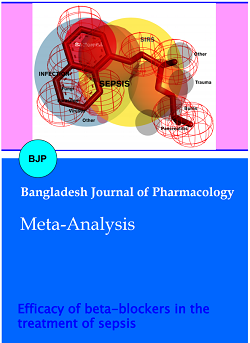Efficacy of beta-blockers in the treatment of sepsis
DOI:
https://doi.org/10.3329/bjp.v16i1.46001Keywords:
Beta-blocker, Meta-analysis, SepsisAbstract
This meta-analysis is to systematically evaluate the efficacy and safety of beta-blockers in the treatment of sepsis. A total of 17 articles that met the inclusion criteria were included, and 10,385 cases were obtained. The meta-analysis results showed that patients with sepsis with beta-blocker usage had a significantly lower 28-day mortality. The heart rate decreased over time in patients with sepsis using beta-blocker. Moreover, central venous blood oxygen saturation increased after 24, 48, 72 hours of treatment; lactic acid and cardiac troponin I decreased after 48, 72 hours of treatment; and tumor necrosis factor-α, interleukin-1β levels decreased significantly after 12, 24, 48, 72 hours of treatment (p<0.05). In conclusion, beta-blockers reduce 28-day mortality and heart rate.
Downloads
221
176

Downloads
Published
How to Cite
Issue
Section
License
Authors who publish with this journal agree to the following terms:
- Authors retain copyright and grant the journal right of first publication with the work simultaneously licensed under a Creative Commons Attribution License that allows others to share the work with an acknowledgement of the work's authorship and initial publication in this journal.
- Authors are able to enter into separate, additional contractual arrangements for the non-exclusive distribution of the journal's published version of the work (e.g., post it to an institutional repository or publish it in a book), with an acknowledgement of its initial publication in this journal.
- Authors are permitted and encouraged to post their work online (e.g., in institutional repositories or on their website) prior to and during the submission process, as it can lead to productive exchanges, as well as earlier and greater citation of published work (See The Effect of Open Access).
